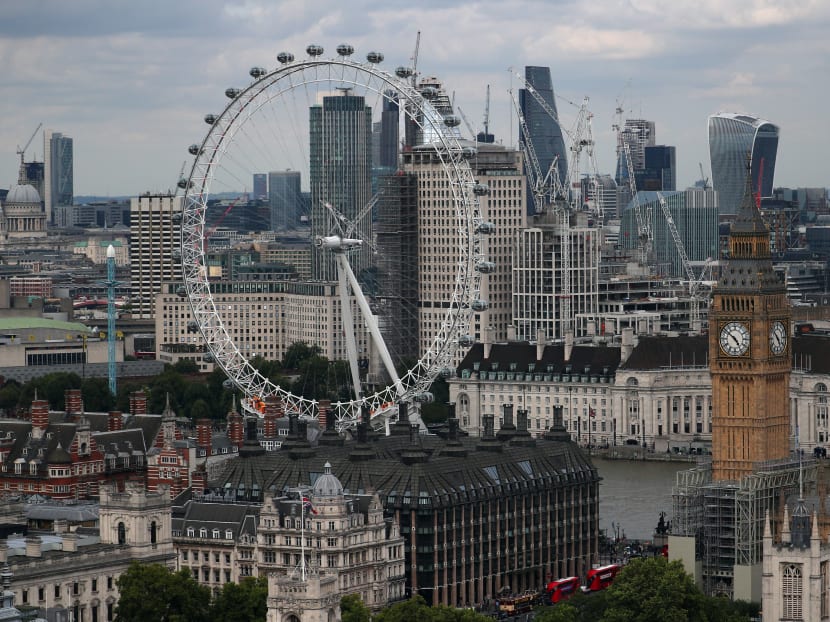Wealthy Chinese apply to move to the UK at the highest rate since 2014 as the trade war puts them off the US
HONG KONG — The trade war is driving rich Chinese people to drop their plans to emigrate to the US and seek alternative destinations in Europe, particularly the UK, the latest data suggests.

The London Eye, the Big Ben clock tower and the City of London financial district. Applications for so-called tier-1 investor visas to the UK by ultra-wealthy Chinese jumped by more than half in the first quarter of 2019.
HONG KONG — The trade war is driving rich Chinese people to drop their plans to emigrate to the US and seek alternative destinations in Europe, particularly the UK, the latest data suggests.
Applications for so-called tier-1 investor visas to the UK by ultra-wealthy Chinese jumped by more than half to 83 — including 10 from Hong Kong — in the first quarter of 2019 from 54 in the preceding three months, according to Growthdeck.
That is the highest number since the fourth quarter of 2014, according to the London-based investment services firm.
Under UK rules, a foreign investor can obtain the “golden visas” for themselves and their dependents by investing £2 million (S$3.41 million) in British companies. The visa gives them the right to stay in the UK for three years and four months, with the option of extending for another two years and of applying as for citizenship afterwards.
Mr Samuel Hu, head of overseas investors at Growthdeck, said the escalation in the trade war between the US and China, a weak British currency, and a growing desire among wealthy Chinese to diversify their investment portfolios lie behind the spike in applications to relocate to the UK.
Meanwhile, the EB-5 visa scheme, the US’ equivalent of the UK programme, has seen falling numbers of applicants. Data from the US State Department shows visas issued to China-born applicants last year under EB-5 dropped by almost half from the peak in 2014.
The trade war, and waiting times of up to 16 years for some applicants, are the major reasons for the waning interest, analysts said.
“For Chinese clients, fears about not being welcomed because of the trade war are making them look more closely at the realities of the EB-5 programme,” said Mr David Lesperance, managing partner at Lesperance & Associates.
“The UK is a favoured choice because of the great educational opportunities it offers, excellent investment opportunities, and low taxes.”
There are further problems with EB-5, he said, including rigid enforcement of global taxation by the US authorities, rampant fraud, and the loss of investment that has befallen many previous applicants.
“At that point they run away from the EB-5 program and focus on the much better alternatives,” he said.
The minimum investment to qualify for an EB-5 visa will rise from US$500,000 (S$690,345) to US$900,000 from November this year.
Places like Portugal, Cyprus, Turkey and Singapore are starting to getting a lot of attention too, on top of the more traditional emigration destinations such as Canada and Australia, he said.
Ms Esther Yong, director of Sodichan.com, a cross-border property dealing platform, said she has seen the same trend.
“The queue in the US is getting longer, and emigration rules are getting tougher for other traditional popular destinations including Canada and Australia. So people are starting to look for other options,” she said.
Turkey has quickly become an attractive destination, particularly among Chinese Muslims. Portugal is alluring with its lower investment threshold, speedy procedures and international schools. And Cyprus offers easy access to citizenship, said Ms Yong.
Mr Georg Chmiel, executive chairman at Juwai, said in an earlier interview that since Portugal introduced its own “golden visa” scheme, Chinese nationals have taken 60 per cent of all visas issued, and have invested an estimated US$2.8 billion through the programme.
Growthdeck recommended Chinese candidates for the British tier-1 investors visa programme move ahead with their plans as quickly as possible because of the policy uncertainty against the backdrop of Brexit.
The pound was trading at just below US$1.50 before Britain voted to leave the EU in June 2016, but with the Brexit drama simmering and a no-deal exit looming, the currency had plunged by 20 per cent to a three-year low early this week. It has been struggling to rebound, and was trading around US$1.23 on Monday. SOUTH CHINA MORNING POST






